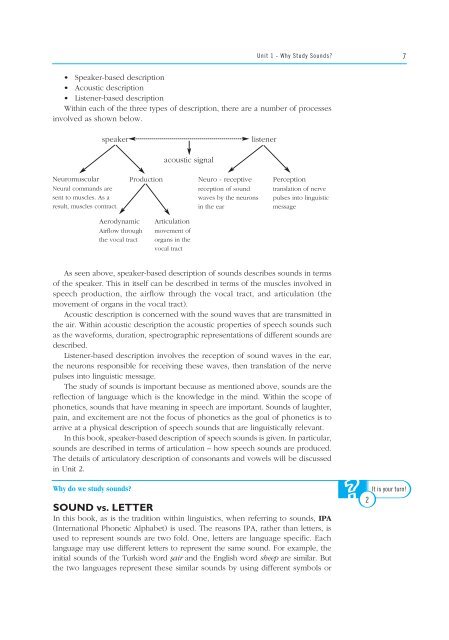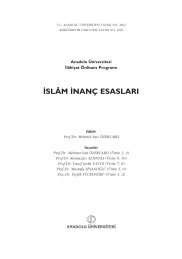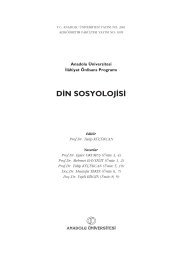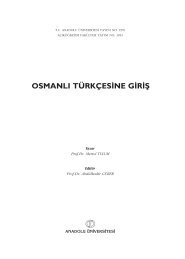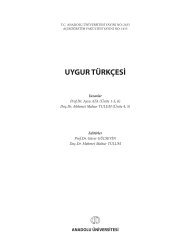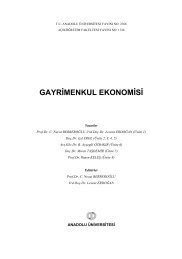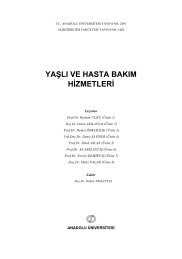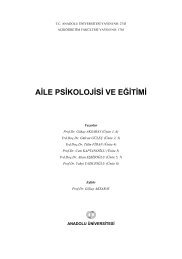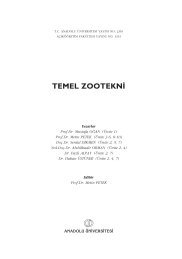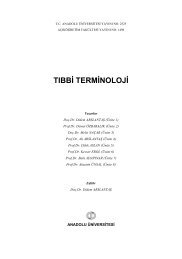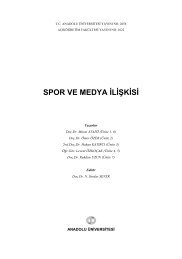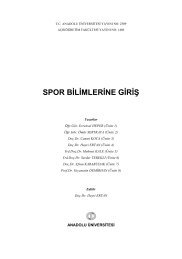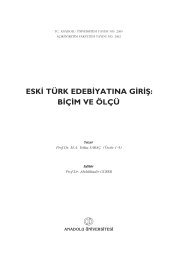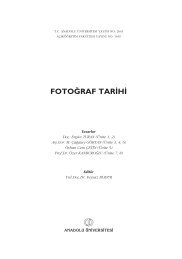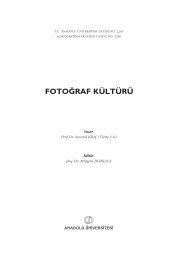turkish phonology and morphology (türkçe ses ve b‹ç‹mb‹lg‹s‹)
turkish phonology and morphology (türkçe ses ve b‹ç‹mb‹lg‹s‹)
turkish phonology and morphology (türkçe ses ve b‹ç‹mb‹lg‹s‹)
Create successful ePaper yourself
Turn your PDF publications into a flip-book with our unique Google optimized e-Paper software.
• Speaker-based description<br />
• Acoustic description<br />
• Listener-based description<br />
Within each of the three types of description, there are a number of proces<strong>ses</strong><br />
invol<strong>ve</strong>d as shown below.<br />
Neuromuscular<br />
Neural comm<strong>and</strong>s are<br />
sent to muscles. As a<br />
result, muscles contract.<br />
speaker listener<br />
Aerodynamic<br />
Airflow through<br />
the vocal tract<br />
acoustic signal<br />
As seen abo<strong>ve</strong>, speaker-based description of sounds describes sounds in terms<br />
of the speaker. This in itself can be described in terms of the muscles invol<strong>ve</strong>d in<br />
speech production, the airflow through the vocal tract, <strong>and</strong> articulation (the<br />
mo<strong>ve</strong>ment of organs in the vocal tract).<br />
Acoustic description is concerned with the sound wa<strong>ve</strong>s that are transmitted in<br />
the air. Within acoustic description the acoustic properties of speech sounds such<br />
as the wa<strong>ve</strong>forms, duration, spectrographic representations of different sounds are<br />
described.<br />
Listener-based description invol<strong>ve</strong>s the reception of sound wa<strong>ve</strong>s in the ear,<br />
the neurons responsible for receiving these wa<strong>ve</strong>s, then translation of the ner<strong>ve</strong><br />
pul<strong>ses</strong> into linguistic message.<br />
The study of sounds is important because as mentioned abo<strong>ve</strong>, sounds are the<br />
reflection of language which is the knowledge in the mind. Within the scope of<br />
phonetics, sounds that ha<strong>ve</strong> meaning in speech are important. Sounds of laughter,<br />
pain, <strong>and</strong> excitement are not the focus of phonetics as the goal of phonetics is to<br />
arri<strong>ve</strong> at a physical description of speech sounds that are linguistically relevant.<br />
In this book, speaker-based description of speech sounds is gi<strong>ve</strong>n. In particular,<br />
sounds are described in terms of articulation – how speech sounds are produced.<br />
The details of articulatory description of consonants <strong>and</strong> vowels<br />
It is your<br />
will<br />
turn!<br />
be discussed<br />
in Unit 2.<br />
1 1<br />
Why do we study sounds?<br />
Production<br />
SOUND vs. LETTER<br />
Articulation<br />
mo<strong>ve</strong>ment of<br />
organs in the<br />
vocal tract<br />
Neuro - recepti<strong>ve</strong><br />
reception of sound<br />
wa<strong>ve</strong>s by the neurons<br />
in the ear<br />
Unit 1 - Why Study Sounds?<br />
Perception<br />
translation of ner<strong>ve</strong><br />
pul<strong>ses</strong> into linguistic<br />
message<br />
In this book, as is the tradition within linguistics, when referring to sounds, IPA<br />
It is your turn!<br />
(International Phonetic Alphabet) is used. The reasons IPA, rather than letters, is<br />
3<br />
used to represent sounds are two fold. One, letters are language specific. Each<br />
language may use different letters to represent the same sound. For example, the<br />
It is your turn!<br />
3<br />
initial sounds of the Turkish word flair <strong>and</strong> the English word It sheep is your are turn! similar. But<br />
It is your turn!<br />
the two languages represent these similar sounds by using different symbols 4 or 4<br />
7<br />
It is your turn!<br />
It is your turn!<br />
It is your turn!<br />
2 2<br />
It is your turn!<br />
It is your turn!<br />
5 5<br />
It is your turn!<br />
It is your turn!<br />
6 6


